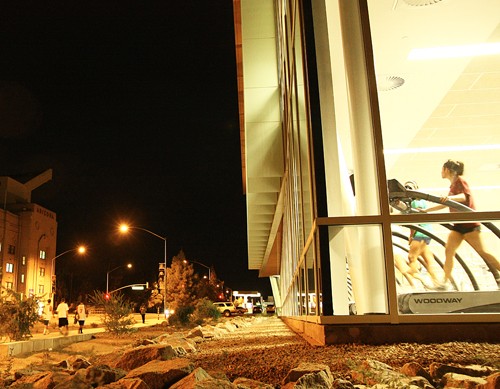Students will be paying a $150 Campus Health Service fee this semester for the Student Recreation Center and Campus Health.
The fee was approved by the Arizona Board of Regents in March and was designed after continuous budget cuts on both a state and university level.
“”The health and recreation fee was even conceived of or considered as a result of budget cuts,”” said Kris Kreutz, director of administrative services for Campus Health Service. “”We felt we should move from a less stable to a more stable funding source.””
Campus Health Service and Campus Recreation surveyed 4,800 students last year before requesting the fee. Out of the students surveyed, 64 percent approved a mandatory fee.
“”We did have student support,”” Kreutz said.
Many students were not aware of the fee until they received their Bursar’s statement.
“”It was just when I went to pay the bills,”” said Nate Kennedy, a systems engineering senior. “”I think it was expected with the [Recreation Center] expansion. I wasn’t really surprised,”” Kennedy said.
Approximately $1.6 million of previous state and university funding for Campus Health Service has been returned to the university due to the fee. Campus Recreation has returned an additional $589,000 in funding.
“”That money will be allocated or reused elsewhere,”” said Ron Roberts, senior business manager for Campus Recreation.
Campus Health Service receives $80 per student from each fee. The money will be used to maintain its current services as well as hire new staff in areas with increased demand including counselors, psychologists, and registered nurses.
“”We are filling some of those positions previously cut,”” Kreutz said. “”We need to have people here to provide those services.””
Campus Health Service provides counseling and medical services as well as public health information.
“”Presumably, all students are receiving benefit from that,”” Kreutz said.
The remaining $70 goes to Campus Recreation, particularly ongoing maintenance with the recently renovated Student Recreation Center.
“”The weight room virtually tripled in square footage, and the number of pieces of cardio equipment quadrupled,”” said Roberts, who estimated that 25 percent of this equipment will need to be replaced each year.
The Recreation Center has also returned to the operating hours in place before budget cuts.
“”A portion of that fee is also supporting a return to these operating hours,”” Roberts said.
According to university statistics, about 64 percent to 67 percent of students use the Recreation Center while 50 percent use Campus Health Service.
Some students do not feel they utilize the services enough to warrant the new fee.
“”Living off-campus, I don’t see when I’m ever going to use it,”” Kennedy said of the two services.
Other students use the services frequently and say they benefit from the improvements.
“”I think it’s worth it. I don’t have much complaining to do,”” said Alfredo Vargas, an environmental hydrology and water resourcesfreshman.
The fee could potentially increase to $306 next year if approved by the Arizona Board of Regents.
“”We don’t know that absolutely. [ABOR] did approve the language of the two-year fee “” Kreutz said. “”I don’t expect it to go up, honestly.””









